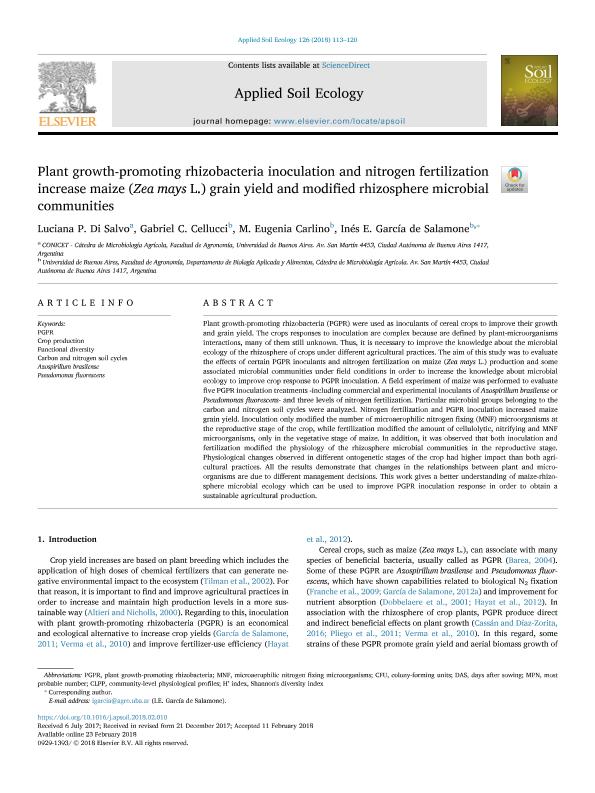Mostrar el registro sencillo del ítem
dc.contributor.author
Di Salvo, Luciana Paula

dc.contributor.author
Cellucci, Gabriel C.
dc.contributor.author
Carlino, Maria Eugenia

dc.contributor.author
Garcia, Inés Eugenia

dc.date.available
2020-01-29T20:40:14Z
dc.date.issued
2018-05
dc.identifier.citation
Di Salvo, Luciana Paula; Cellucci, Gabriel C.; Carlino, Maria Eugenia; Garcia, Inés Eugenia; Plant growth-promoting rhizobacteria inoculation and nitrogen fertilization increase maize (Zea mays L.) grain yield and modified rhizosphere microbial communities; Elsevier Science; Applied Soil Ecology; 126; 5-2018; 113-120
dc.identifier.issn
0929-1393
dc.identifier.uri
http://hdl.handle.net/11336/96164
dc.description.abstract
Plant growth-promoting rhizobacteria (PGPR) were used as inoculants of cereal crops to improve their growth and grain yield. The crops responses to inoculation are complex because are defined by plant-microorganisms interactions, many of them still unknown. Thus, it is necessary to improve the knowledge about the microbial ecology of the rhizosphere of crops under different agricultural practices. The aim of this study was to evaluate the effects of certain PGPR inoculants and nitrogen fertilization on maize (Zea mays L.) production and some associated microbial communities under field conditions in order to increase the knowledge about microbial ecology to improve crop response to PGPR inoculation. A field experiment of maize was performed to evaluate five PGPR inoculation treatments -including commercial and experimental inoculants of Azospirillum brasilense or Pseudomonas fluorescens- and three levels of nitrogen fertilization. Particular microbial groups belonging to the carbon and nitrogen soil cycles were analyzed. Nitrogen fertilization and PGPR inoculation increased maize grain yield. Inoculation only modified the number of microaerophilic nitrogen fixing (MNF) microorganisms at the reproductive stage of the crop, while fertilization modified the amount of cellulolytic, nitrifying and MNF microorganisms, only in the vegetative stage of maize. In addition, it was observed that both inoculation and fertilization modified the physiology of the rhizosphere microbial communities in the reproductive stage. Physiological changes observed in different ontogenetic stages of the crop had higher impact than both agricultural practices. All the results demonstrate that changes in the relationships between plant and microorganisms are due to different management decisions. This work gives a better understanding of maize-rhizosphere microbial ecology which can be used to improve PGPR inoculation response in order to obtain a sustainable agricultural production.
dc.format
application/pdf
dc.language.iso
eng
dc.publisher
Elsevier Science

dc.rights
info:eu-repo/semantics/openAccess
dc.rights.uri
https://creativecommons.org/licenses/by-nc-nd/2.5/ar/
dc.subject
AZOSPIRILLUM BRASILENSE
dc.subject
CARBON AND NITROGEN SOIL CYCLES
dc.subject
CROP PRODUCTION
dc.subject
FUNCTIONAL DIVERSITY
dc.subject
PGPR
dc.subject
PSEUDOMONAS FLUORESCENS
dc.subject.classification
Agricultura

dc.subject.classification
Agricultura, Silvicultura y Pesca

dc.subject.classification
CIENCIAS AGRÍCOLAS

dc.title
Plant growth-promoting rhizobacteria inoculation and nitrogen fertilization increase maize (Zea mays L.) grain yield and modified rhizosphere microbial communities
dc.type
info:eu-repo/semantics/article
dc.type
info:ar-repo/semantics/artículo
dc.type
info:eu-repo/semantics/publishedVersion
dc.date.updated
2020-01-29T19:10:41Z
dc.journal.volume
126
dc.journal.pagination
113-120
dc.journal.pais
Países Bajos

dc.journal.ciudad
Amsterdam
dc.description.fil
Fil: Di Salvo, Luciana Paula. Consejo Nacional de Investigaciones Científicas y Técnicas; Argentina. Universidad de Buenos Aires. Facultad de Agronomía. Departamento de Biología Aplicada y Alimentos. Cátedra de Microbiología Agrícola; Argentina
dc.description.fil
Fil: Cellucci, Gabriel C.. Universidad de Buenos Aires. Facultad de Agronomía. Departamento de Biología Aplicada y Alimentos. Cátedra de Microbiología Agrícola; Argentina
dc.description.fil
Fil: Carlino, Maria Eugenia. Universidad de Buenos Aires. Facultad de Agronomía. Departamento de Biología Aplicada y Alimentos. Cátedra de Microbiología Agrícola; Argentina
dc.description.fil
Fil: Garcia, Inés Eugenia. Universidad de Buenos Aires. Facultad de Agronomía. Departamento de Biología Aplicada y Alimentos. Cátedra de Microbiología Agrícola; Argentina. Consejo Nacional de Investigaciones Científicas y Técnicas; Argentina
dc.journal.title
Applied Soil Ecology

dc.relation.alternativeid
info:eu-repo/semantics/altIdentifier/doi/http://dx.doi.org/10.1016/j.apsoil.2018.02.010
dc.relation.alternativeid
info:eu-repo/semantics/altIdentifier/url/https://www.sciencedirect.com/science/article/pii/S0929139317307576
Archivos asociados
